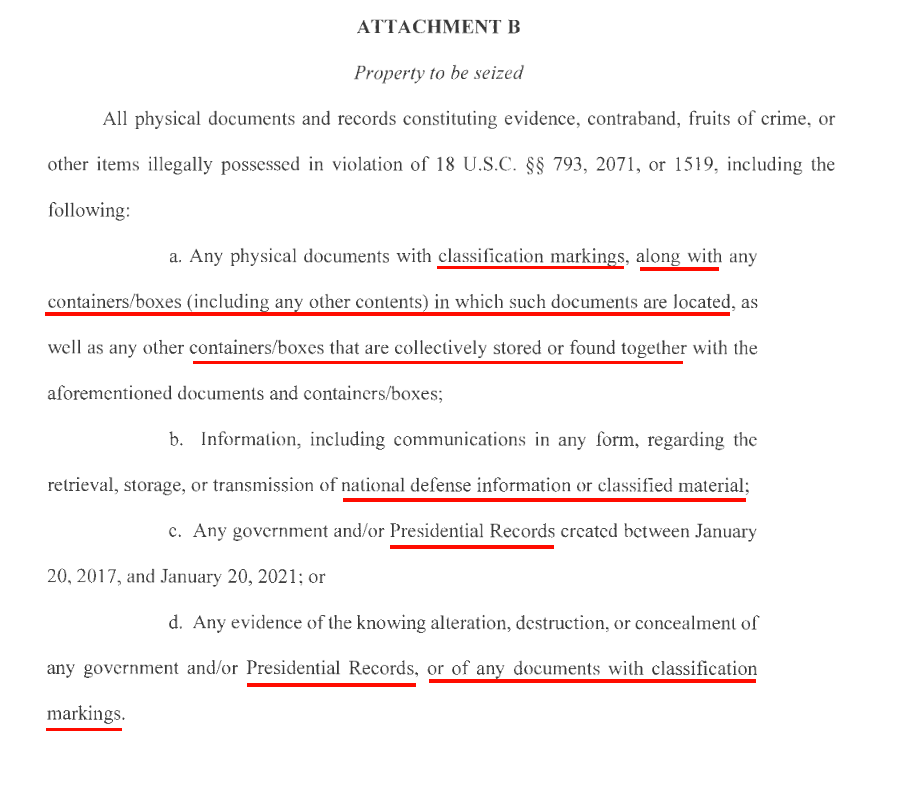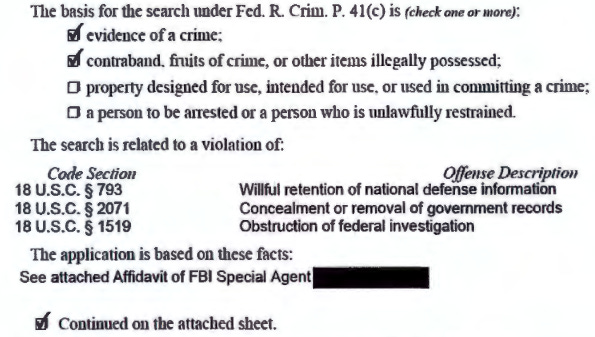FBI Search Warrant Recovers Boxes of Documents at Trump Florida Club House
Warrant lists three laws (18 U.S.C. §§ 793; 1519; 2017) related to obstruction of an investigation, and mishandling/hiding/destruction of U.S. documents -- including national security documents
In This Issue:
Warrant Receipt Suggests Search of Trump Mar-a-Lago Club House Recovered Items Matching Warrant Description
Poem for 2022.08.19
Out And About Photo for 2022.08.19
Warrant Receipt Suggests Search of Trump Mar-a-Lago Club House Recovered Items Matching Warrant Description
The latin phrase Littera Scripta Manet translates to “the written letter remains,” and it is the official motto of the National Archives and Records Administration, or NARA. NARA has existed since 1934, and became its own independent agency under President Ronald Reagan in 1985. When a President’s term in office is over, all of the Presidential Records created or received come under the “custody, control, and preservation of, and access” of the Archivist of the United States at NARA.1 Presidential Record is defined by law to mean any document created or received “in the course of conducting activities which relate to or have an effect upon the carrying out of the constitutional, statutory, or other official or ceremonial duties of the President.”2 That goes for every President, and means NARA is the keeper of all those Presidential Records at presidential libraries you pretend to want to visit.

In the last days of the Trump presidency there was an apparent scramble to get document collections into bankers boxes, which were then shipped to the former President’s Mar-a-Lago Club House.
According to various court filings, grand jury subpoenas, and Trump attorney statements going back to at least January of this year, document collections were being ‘discovered’ that were not supposed to be at Trump’s Mar-a-Lago Club House. This history of unreliability, especially with the apparently false attorney declaration concerning classified documents, may have been a key factor as to why the FBI decided to request a search warrant on Friday, August 5, which was then executed on Monday, August 8.
According to the warrant application cover, the search was premised on investigations regarding violations of the following codes (along with a condensed offense description).3
18 U.S.C. § 793 Willful retention of national defense information
18 U.S.C. § 2071 Concealment or removal of government records
18 U.S.C . § 1519 Obstruction of federal investigation
Outside publicly available references such as the behavior linked above, obstruction of a federal investigation (§ 1519) is too speculative at this time for me to dig into. Regarding § 793 and § 2071 — by definition — if former President Donald Trump has Presidential Records at his Florida Club House, then he has government owned records at the property.4 There is discussion in certain corners of the American media regarding document classification levels relating to the national defense information being referenced in the warrant. Neither § 793 or § 2071 make any mention of classification. The classification discussion is relevant in the sense that one might infer that the national defense is involved, or that something is a Presidential Record as opposed to a Personal Record, or in weighing the severity of a potential punishment, but classification levels are not legally dispositive to establishing the violation of these laws. That being said, references to classification markings and material are used throughout Attachment B of the warrant pictured below. This attachment has a general description of the property to be seized [red underlining added by me].
An incumbent President controls nearly all classification procedures deriving from the Constitutional provision of being the “Commander-in-Chief.” Presidents issue Executive Orders that detail classification schedules and procedures. The most recent one, EO 13489, comes from 2009. The classification process itself not being set in stone along with changing national interest needs, can also result in information not just being de-classified, but re-classified. One of the benefits of NARA having custodial control of documents, is that they are archivists and know where things are, and what their status is supposed to be. Trump attorneys reportedly signed a declaration that all classified materials had been turned over. The most charitable interpretation to the boxes of documents that have since been seized from Mar-a-Lago is that DJT and company never undertook a real inventory, then deluded themselves into believing they had, and simply did not know what was in the boxes when the FBI asked. I do not think they can explain away the items listed on the warrant receipt with classification markings, or that otherwise appear to be Presidential Records.
Factually speaking, is there a retention of national defense information (§ 793) in that warrant receipt? The receipt says there are sets of documents with the highest levels of classification. This suggests things related to national defense information, and Presidential Records rather than Personal Records. Meaning, these documents are likely the property of the United States and therefore meant to be under the legal custodial control of NARA, not something to be squirreled away at Trump’s Mar-a-Lago Club House.
Even though DJT does not own any of the Presidential Records at his Mar-a-Lago Club House, protection of his private property housing the boxes from unreasonable search and seizure is based in the 4th Amendment to the Constitution, which states:
…no Warrants shall issue, but upon probable cause, supported by Oath or affirmation, and particularly describing the place to be searched, and the persons or things to be seized.
Although currently sealed from the public, whatever was in the warrant’s affidavit of probable cause was apparently enough to get both a Trump appointed FBI Director, and a Trump appointed [appointed during Trump’s term**] judge to sign-off on its execution. Immediate concerns of security information relating to the documents aside, such violations appear relatively simple to prove in terms of item definition, location, and control. At first glance, the FBI looks strong here to go forward with a warrant as compared to a more complex violation of law.
Since the search on August 8, DJT has been making fiery statements to his followers. One thing he was bemoaning was ‘transparency,’ first demanding an unsealed warrant (that Trump had in his possession the entire time), and then for the unsealed affidavit. Regardless of the amount and variety of statements the former President has made the past two weeks, the fact remains that the former President’s legal team never filed a motion with the Court regarding the release of the search warrant (Trump’s team only acquiescing to the FBI’s request to release it), nor did the Trump legal team actually join news outlet petitioners that motioned the court for a release of the probable cause affidavit.
The news outlets’s request for the unsealing of the affidavit for probable cause was partially approved by Judge Reinhart over objections by the FBI on Thursday, August 18. The affidavit’s release is pending FBI redactions to shield ongoing investigations. The FBI is to bring back a suitably redacted document for the Court’s review by Thursday, August 25. It is expected that a lot of the probable cause affidavit will be redacted.
This search is not a formal indictment of any crime. The search is simply executed according to a warrant based on probable cause that multiple crimes have been committed. On the face of things, the warrant appears to be valid, and the receipt suggests it may have found at least some of what it sought, but until more is known, either through the unsealing of the supporting affidavit for probable cause, or criminal indictments, it remains just another step in an investigatory process.
Time will tell the importance that this search, or ‘raid,’ plays into this and other current investigations of the Former President (if any). It is the legal duty of the Archivist to make sure that Presidential Records are appropriately accounted for because those documents belong to the People’s government, and are not personal property. The circumstances that NARA found itself facing due to former President Trump is unprecedented, and it is therefore not surprising that the government would eventually feel compelled to execute a warrant to recover its own records.
*This issue updated for spelling on 2022.08.26
**Federal Magistrate Judges, such as Reinhart, are appointed by a majorty vote of Federal District Judges (which are appointed by the President and confirmed by the Senate). [This issue updated with this information on 2022.08.26]
Poem for 2022.08.19
Gray cliffs roll above Midday rain settles the dust Wet rock aroma
Out And About Photo for 2022.08.19
August evening, downtown (Belltown).
Footnotes for 2022.08.19
https://www.archives.gov/about/laws/presidential-records.html#2203
§ 2203. Management and custody of Presidential records
…
(g)(1) Upon the conclusion of a President’s term of office, or if a President serves consecutive terms upon the conclusion of the last term, the Archivist of the United States shall assume responsibility for the custody, control, and preservation of, and access to, the Presidential records of that President. The Archivist shall have an affirmative duty to make such records available to the public as rapidly and completely as possible consistent with the provisions of this chapter.
https://www.archives.gov/about/laws/presidential-records.html#2201
§ 2201. Definitions
…
(2) The term "Presidential records" means documentary materials, or any reasonably segregable portion thereof, created or received by the President, the President’s immediate staff, or a unit or individual of the Executive Office of the President whose function is to advise or assist the President, in the course of conducting activities which relate to or have an effect upon the carrying out of the constitutional, statutory, or other official or ceremonial duties of the President. …
https://www.archives.gov/about/laws/presidential-records.html#2202
§ 2202. Ownership of Presidential records
The United States shall reserve and retain complete ownership, possession, and control of Presidential records; and such records shall be administered in accordance with the provisions of this chapter.





